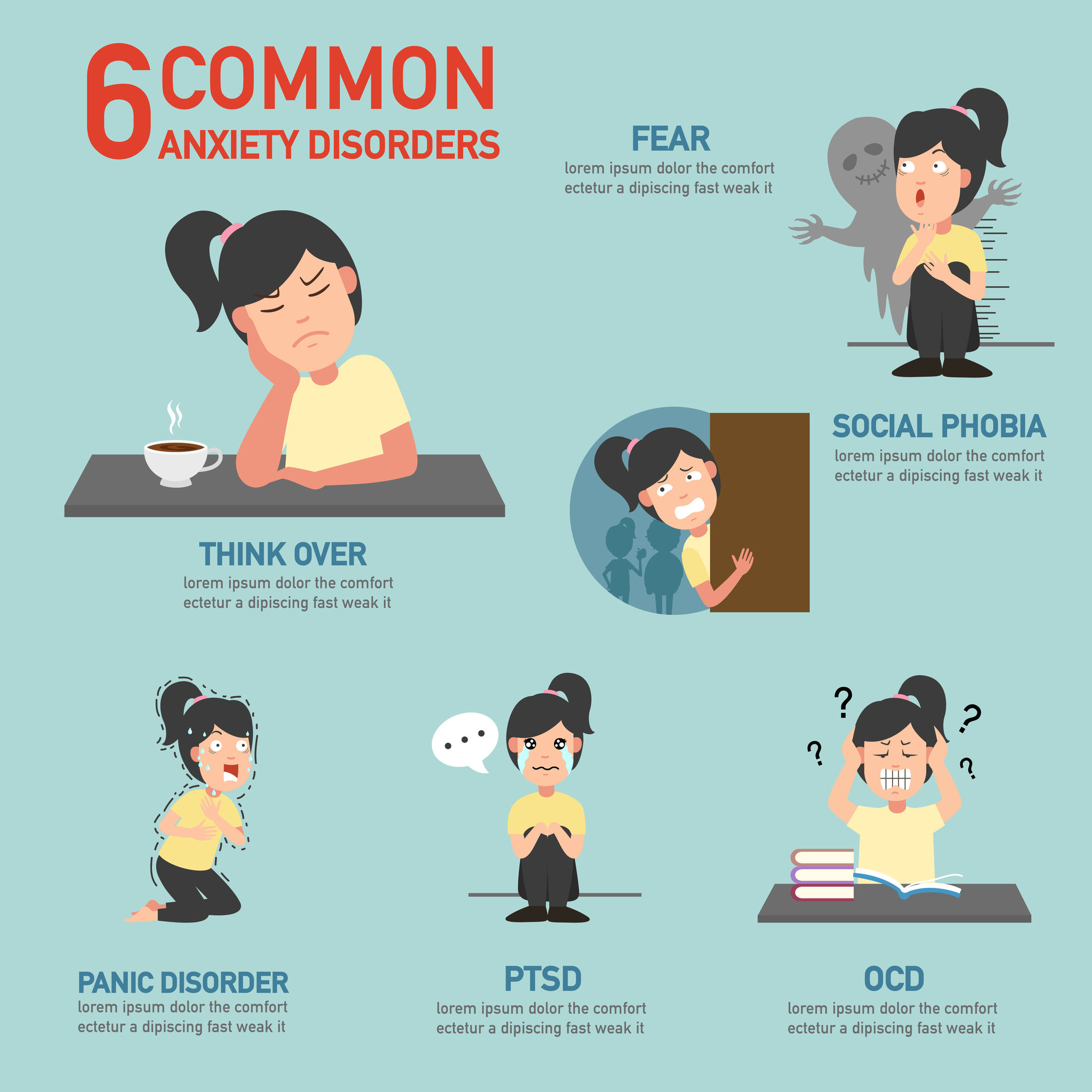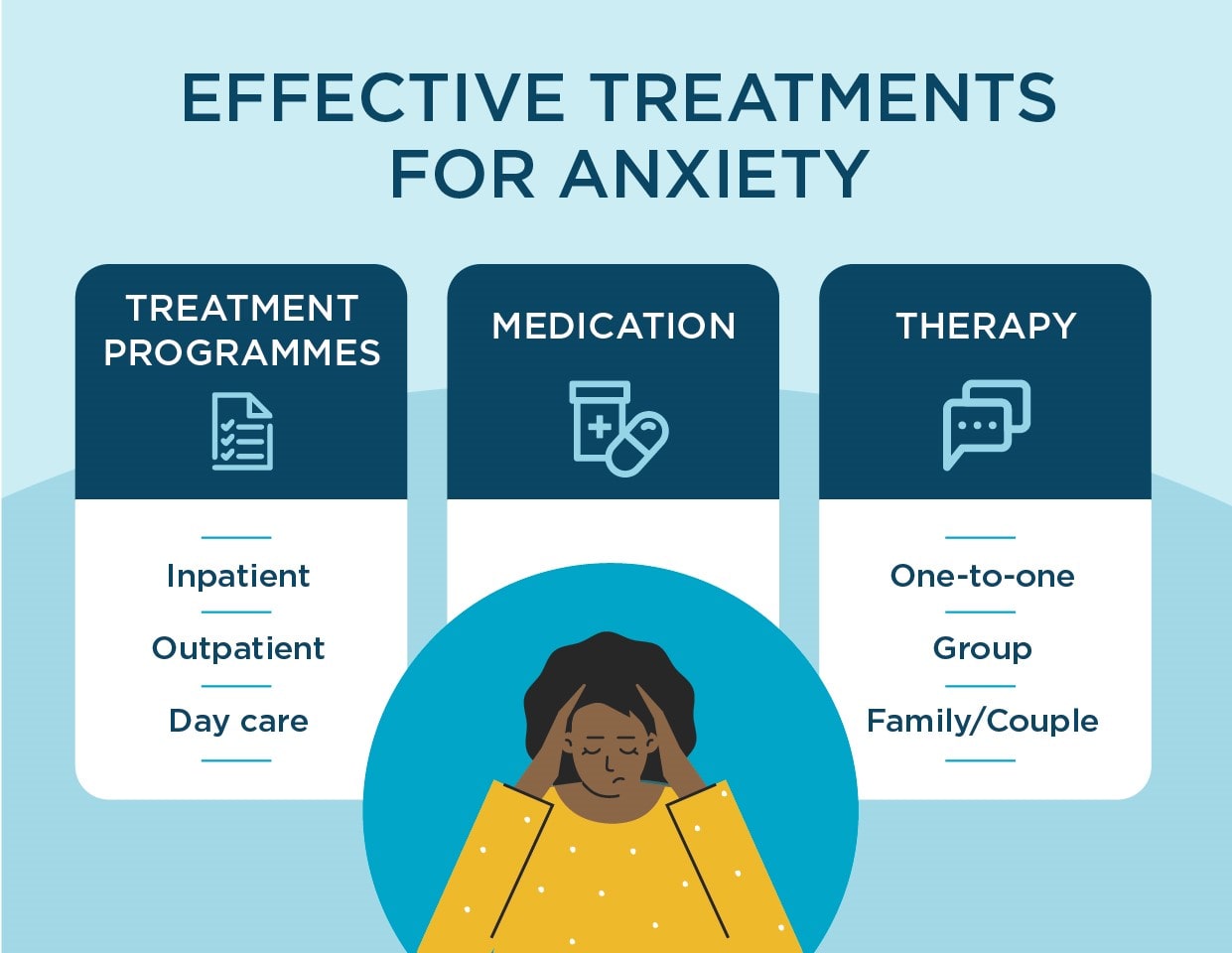Counselling for anxiety disorder available virtually and face-to-face near you
Counselling for anxiety disorder available virtually and face-to-face near you
Blog Article
Exploring Different Strategies in Therapy for Anxiety Disorder for Lasting Change
When tackling anxiety disorders, it's important to explore a variety of therapy approaches. Each method offers distinct insights and tools to help you handle your symptoms effectively. You might discover that integrating methods can yield the very best results. Understanding the subtleties of these strategies is crucial to cultivating long-term change. What if the right mix could release a new level of psychological wellness for you?
Understanding Anxiety Conditions: A Short Overview
Stress and anxiety disorders, which affect millions of individuals worldwide, can significantly impact life. You may experience overwhelming sensations of concern or worry that seem uncontrollable. These feelings can bring about physical signs and symptoms like a racing heart, sweating, or also lightheadedness. Common sorts of stress and anxiety disorders include generalised anxiety problem, panic disorder, and social anxiousness condition. Each has unique indicators, yet they all share a propensity to disrupt your regular and relationships.Understanding the root creates of your stress and anxiety is essential. It may originate from genetics, brain chemistry, or life experiences. Identifying your triggers can help you handle your responses better. It's important to bear in mind that you're not the only one in this struggle. Many individuals deal with comparable challenges, and seeking assistance is a solid step toward sensation much better. By discovering anxiety conditions, you're currently on the path to understanding and managing your condition better.
Cognitive-Behavioral Therapy: Challenging Negative Thought Patterns
In Cognitive-Behavioral Treatment, you'll begin by recognizing the adverse thought causes that contribute to your stress and anxiety. You'll work on replacing them with more positive options when you identify these ideas. With each other, you'll construct reliable coping approaches to aid manage your anxiety in everyday situations.
Determining Unfavorable Idea Triggers

Identifying the certain triggers behind your unfavorable thoughts can be crucial in managing anxiousness when you experience minutes of distress. Begin by paying interest to circumstances that provoke sensations of concern or worry. Is it a congested space, a forthcoming deadline, or a conversation with specific people? Write down these circumstances in a journal. This will certainly aid you determine patterns in your reasoning. Notice physical sensations that accompany your unfavorable thoughts, like an auto racing heart or rigidity in your upper body. By pinpointing these triggers, you gain insight into what's sustaining your stress and anxiety. Comprehending these connections is the first action in testing those thoughts and inevitably gaining back control over your emotional feedbacks.
Changing Ideas With Positives
Challenging adverse idea patterns is an essential action in transforming your mindset and minimizing anxiety. You may usually find on your own entraped in cycles of self-doubt or devastating reasoning. As opposed to letting these thoughts dictate your sensations, technique replacing them with positive affirmations or practical alternatives. When you think, "I can not handle this," change it to, "I can manage difficulties one action at a time." This simple change can significantly influence your mood. Consistently determining and countering these unfavorable ideas aids develop a much healthier inner dialogue. Remember, it takes time and effort, but regularly practicing this technique can result in long lasting modification, equipping you to deal with stress and anxiety with renewed confidence and durability.
Structure Coping Approaches Together
Replacing negative ideas is just the start of managing anxiety effectively. To develop long lasting modification, you need to construct coping approaches that encourage you. Cognitive-Behavioral Treatment (CBT) assists you identify and test those purposeless idea patterns. Together, you and your counselor can discover exactly how these thoughts impact your feelings and behaviors.Start by developing practical techniques, like journaling or mindfulness exercises, that enable you to face stress and anxiety head-on. When you encounter your concerns gradually, you'll learn to react in different ways.

Mindfulness and Acceptance-Based Approaches: Growing Present-Moment Understanding
As you browse the intricacies of anxiousness, integrating mindfulness and acceptance-based methods can considerably boost your capability to grow present-moment awareness. By focusing on the below and currently, you'll discover that you can observe your thoughts and feelings without judgment (Counseling services for anxiety). This technique assists you recognize your stress and anxiety without really feeling bewildered by it.Engaging in mindfulness exercises, such as deep breathing, body scans, or led reflections, allows you to ground yourself in your existing experience. Acceptance-based techniques urge you to embrace your emotions instead than combat versus them. They lose their power over you.Incorporating these methods right into your everyday regimen can change just how you react to anxiousness when you accept your feelings. You'll establish strength and learn to navigate demanding scenarios with greater ease. Eventually, cultivating present-moment understanding lays the foundation for enduring modification, equipping you to lead a much more meeting life
Direct Exposure Therapy: Confronting Fears Slowly
Exposure therapy assists you challenge your fears in a gradual way, making it less overwhelming. You'll discover strategies to encounter anxiety-provoking situations step by step, while also building coping approaches to handle your responses. This method empowers you to take control and reduce anxiousness with time.
Steady Direct Exposure Methods

When dealing with stress and anxiety, progressively facing your fears can be an effective way to gain back control. This additional info technique, referred to as steady exposure, entails slowly subjecting on your own to the circumstances or things that trigger your anxiousness. Start with much less daunting situations and progressively work your method approximately more difficult ones. If you're terrified of public speaking, you may start by speaking in front of a mirror, then progress to sharing ideas with a close friend, and eventually deal with a small group. Each action helps desensitize you to the fear, constructing your self-confidence in time. Remember, it's crucial to pace yourself and celebrate little success as you relocate via this process, reinforcing your capacity to manage anxiety effectively.
Structure Coping Techniques
Building effective coping methods is crucial for managing stress and anxiety, particularly as you confront your fears gradually - Counseling services for anxiety. One effective approach is direct exposure treatment, where you start by encountering your fears in a controlled fashion. Begin with less intimidating scenarios and slowly function your way up to even more tough situations. This steady direct exposure helps desensitize you to stress and anxiety sets off, making them much less overwhelming.Incorporate leisure strategies, such as deep breathing or mindfulness, to soothe your mind throughout direct exposure. Track your progression, celebrating small triumphes along the road to increase your confidence. Keep in mind, it's all right to take your time; the goal isn't excellence but constant improvement. By building these methods, you'll encourage yourself to browse stress and anxiety and accept life more fully
Psychodynamic Treatment: Discovering Root Reasons of Stress And Anxiety
Psychodynamic therapy checks out the unconscious mind, exposing the origin triggers of your anxiety. By examining your ideas, sensations, and previous experiences, this technique assists you discover underlying problems and unresolved problems that might add to your present anxiousness. You'll function with a specialist to examine childhood experiences, relationships, and emotional patterns that form your responses today.As you acquire understanding right into these much deeper layers of your mind, you'll begin to acknowledge exactly how previous occasions affect your present habits. This understanding can lead to catharsis, enabling you to refine emotions you could have suppressed.Through the restorative partnership, you can likewise determine protection devices that might have created gradually, using a clearer path to alter. Inevitably, psychodynamic therapy outfits you with the tools to address your stress and anxiety at its core, advertising long-term change in your about his psychological well-being.
Integrative and Holistic Methods: Integrating Techniques for Greater Effectiveness
Integrating different therapeutic methods can boost your journey toward taking care of anxiousness better. By integrating aspects from cognitive-behavioral treatment, mindfulness methods, and holistic approaches, you can create a personalized approach that addresses your one-of-a-kind requirements. For instance, you could utilize cognitive-behavioral methods to challenge negative idea patterns while incorporating mindfulness workouts to ground yourself in today moment.Additionally, checking out all natural practices such as yoga exercise or reflection can promote relaxation and minimize anxiety signs and symptoms. This mix allows you to develop higher self-awareness and resilience.Experimenting with these varied approaches can assist you discover what resonates most with you. Keep in mind, it's about locating a harmony that functions, rather than staying with a single technique. This integrative approach not just provides immediate relief however likewise here are the findings promotes long-lasting abilities for taking care of anxiousness, empowering you to redeem control over your life.
The Function of Support Solutions: Structure Resilience Via Link
While it might appear that taking care of stress and anxiety is a singular journey, having a strong support system can play a vital role in your durability. Bordering on your own with compassionate friends, family members, or support groups creates a safe room where you can honestly share your experiences and sensations. When you connect with others, you advise yourself that you're not the only one in this struggle.These connections supply inspiration and can offer sensible coping techniques that have actually worked for others. It's additionally a chance to get perspective; close friends can help you see circumstances differently, decreasing sensations of isolation.Moreover, psychological support promotes a feeling of belonging, which can significantly relieve anxiety signs. By leaning on your assistance system, you can build resilience and deal with challenges better. Remember, connecting for assistance suggests toughness, and it can make all the distinction in your trip toward managing anxiety.
Often Asked Concerns
What Are the Typical Signs of Anxiousness Problems?
You could experience uneasyness, exhaustion, difficulty concentrating, irritability, muscle mass tension, and sleep disturbances. Physical signs can consist of quick heart beat, sweating, and shivering. Recognizing these indications early can assist you seek suitable support and treatment.
For How Long Does Treatment Typically Last for Anxiety Problems?
Treatment for anxiousness conditions normally lasts anywhere from a few weeks to several months. It really depends upon your individual requirements, progression, and the methods your therapist uses to help you handle your stress and anxiety efficiently.
Can Drug Be Used Together With Therapy for Stress and anxiety?
Yes, medication can certainly be made use of alongside therapy for stress and anxiety. Combining both strategies often boosts therapy performance, helping you take care of symptoms while discovering underlying problems through therapy (Counseling services for anxiety). Always consult your healthcare provider for tailored guidance
Are There Self-Help Approaches for Handling Stress And Anxiety?
Yes, there are several self-help strategies for taking care of anxiety. You can exercise mindfulness, participate in routine workout, preserve a well balanced diet plan, develop a regular, and utilize deep breathing methods to help in reducing anxiety signs and symptoms efficiently.
How Do I Know if I Required Expert Aid for Anxiety?

Report this page